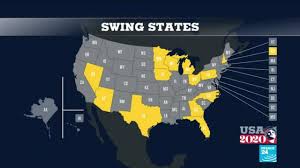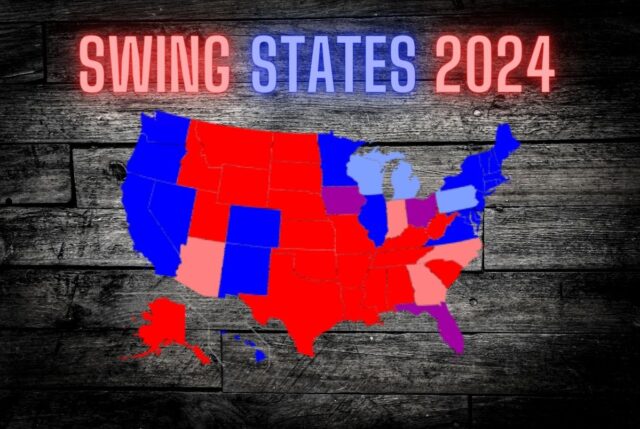Why Swing States Matter in US Elections
Swing states, also called battleground states, play a major role in deciding the outcome of US elections. Unlike safe states, where one political party usually wins easily, swing states can go either way. This unpredictability makes them a key focus for candidates who are looking to secure victory in presidential elections. Because the US uses an Electoral College system to elect its president, winning these states is often essential to getting the 270 electoral votes needed to claim the presidency.
Swing states are important because they don’t have a clear political identity. While some states lean strongly Democratic or Republican, swing states have a more balanced mix of voters. This balance makes them unpredictable, as their voters could be persuaded to vote for either major party in a given election. Because of this, candidates spend a lot of time and resources campaigning in swing states to win over voters.
Over time, different states have been considered swing states. In the past, states like Ohio, Pennsylvania, and Florida were common battlegrounds. More recently, states like Arizona and Georgia have become swing states. As the political landscape of the country changes, so do the states that could swing the election one way or another.
The Electoral College and Its Role
The Electoral College is the system used to elect the president of the United States. Each state is assigned a certain number of electoral votes based on its population. There are 538 total electoral votes, and a candidate must get at least 270 to win. In most states, the candidate who wins the most votes gets all of the state’s electoral votes, even if they only win by a small margin. This system makes winning swing states crucial, as their electoral votes could make or break a candidate’s campaign.
Swing states have enough electoral votes to change the outcome of the election. For example, Florida, one of the largest swing states, has 29 electoral votes. Winning Florida can give a candidate a huge boost in their quest for the presidency. On the other hand, losing a big swing state can be a serious setback, as the other candidate gets all of the electoral votes from that state.
Because the Electoral College gives more weight to states rather than individual voters, candidates must focus their efforts on winning key states instead of just trying to win the most total votes nationwide. This means that while a candidate may get fewer total votes across the country, they can still win the election by securing the right combination of swing states.
How Swing States Influence Campaign Strategies
Candidates tailor their campaign strategies specifically to swing states because of their importance. They spend more time visiting these states, holding rallies, and connecting with local voters. They also tailor their messages to address the specific issues that matter most to the people in these states. For example, in states with a large agricultural industry, candidates might focus on farming policies, while in states with high unemployment, they may emphasize job creation.
In addition to personal visits, candidates also spend a lot of money on advertising in swing states. Television, radio, and online ads are targeted specifically at voters in these areas. Campaigns also use phone calls, text messages, and direct mail to reach out to swing state voters. This heavy investment shows just how important these states are to winning the election.
The focus on swing states also shapes national debates. Issues that are important to swing state voters, such as healthcare, education, and immigration, often become major talking points for candidates. In this way, swing state voters can have an outsized influence on the national conversation, as candidates try to win their support.
Voter Turnout in Swing States

Voter turnout in swing states is often higher than in safe states. This is because voters in swing states know that their vote could make a difference in the outcome of the election. In safe states, where one party has a strong majority, voters might feel like their vote doesn’t matter as much because the outcome is already predictable. But in swing states, every vote counts, and this motivates more people to participate.
Political campaigns in swing states often focus on getting out the vote, meaning they spend a lot of time and effort encouraging people to show up at the polls. This can involve organizing voter registration drives, providing transportation to polling stations, or making sure that voters have the information they need to cast their ballots. By increasing voter turnout in swing states, candidates hope to gain an advantage over their opponent.
Higher voter turnout in swing states can have a ripple effect on down-ballot races, such as those for Congress or state legislatures. When more people vote in swing states, it can change the outcome of not just the presidential race, but also other important elections.
Historical Examples of Swing State Influence
Swing states have decided many US presidential elections throughout history. One of the most famous examples is the 2000 election between George W. Bush and Al Gore. The election came down to a few hundred votes in Florida, where a recount was ordered because the results were so close. After weeks of legal battles, the Supreme Court ultimately decided the election in Bush’s favor, showing just how much power a single swing state can have.
Another example is the 2016 election between Donald Trump and Hillary Clinton. While Clinton won the popular vote by nearly 3 million votes, Trump won the Electoral College by winning key swing states like Michigan, Pennsylvania, and Wisconsin. These states had traditionally been Democratic strongholds, but they swung in Trump’s favor, giving him the electoral votes he needed to win.
These examples highlight the importance of swing states in shaping the outcome of US elections. Even if a candidate wins more votes nationwide, they must still win the right combination of swing states to secure the presidency.
Conclusion: Why Swing States Matter
Swing states are critical to the outcome of US elections because they can go either way. Their unpredictable nature forces candidates to focus their efforts on winning these states, shaping campaign strategies, and influencing national debates. The Electoral College system means that swing states have a lot of power in determining who becomes the president, even if a candidate does not win the popular vote.
By understanding the role of swing states, voters can see why elections are often decided by just a few key states. As political landscapes shift and new swing states emerge, candidates must continue to adapt their strategies to secure the votes they need to win the presidency. In the end, the importance of swing states lies in their ability to determine the direction of the country for years to come.










